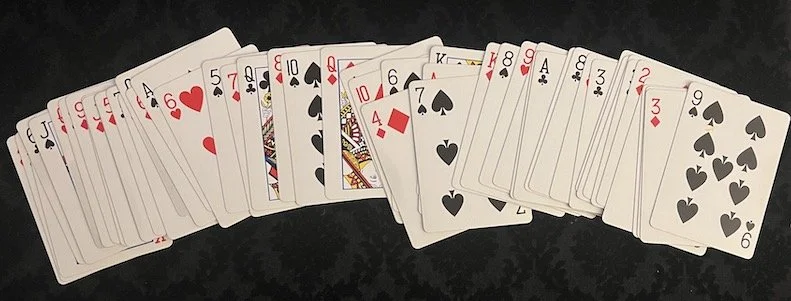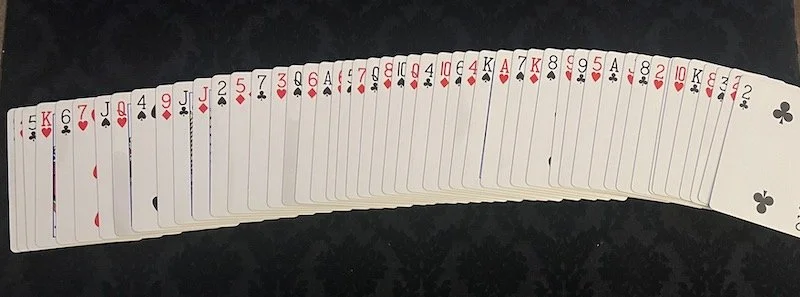Testing Alternates
/Here's a testing suggestion that came in last week that we had already looked at previously…
Don't know if you considered this (not sure if it's that important), but I would love to test out how easy it is for a person to spot that the deck is in red/black alternating order, like you'd use a Si Stebbins stack, for example. —MK
I’ve mentioned in the past the “suspicion” testing we did that used aniPhone app where people could swipe up or down to register their suspicion as they watched a trick.
We also did a much simpler version of “suspicion testing” where we would show people a trick and preface it by saying something like: “This is a trick we are testing out for an upcoming theatrical magic show. We want the trick to feel as fair and innocent as possible. If, as we go through the trick, you see anything that doesn’t ring true, or seems questionable, or unlikely in any way, just raise your hand so we can stop the trick and address what you’re thinking. We really want you to be hyper-critical and not hold back. That will help us make this piece as strong as possible moving forward.”
We found this to be a very good structure when it came to the focus group testing. First, because it allowed us to test a number of things over the course of one trick. And this little speech made people want to stop us and call things out. They didn’t sit on their suspicions or questions. They were much more vocal about these things because we framed it as then being helpful.
We tested the “noticeability” of alternating red/black set-ups for 120 participants total in groups of 3-6 people
. The decks were (false) shuffled and spread face-up on the table at the beginning of the effect.
Here is how the testing was broken down.
Group 1: For 60 participants, the deck of alternating colors was dribbled face-up in a messy spread.
Group 2: For the other 60 participants, the deck was spread face-up in a more clean, even spread.
Within these groups of 60, there were three sub-groups. And those subgroups were formed by how we alluded to the deck during the performance.
Subgroup A: For 1/3 of the people (20 in each group of 60) the deck was just spread on the table with no comment.
Subgroup B: For another 1/3 of the people the deck was spread face-up and the performer said, “We have a full deck here. All the cards are different."
Subgroup C: For the final 1/3, the deck was spread face-up and the performer said, “You can see we have a full deck here. All the cards are different. It’s well shuffled. There are no patterns or groups of cards.”
Obviously for that last third we were really asking for them to call us out.
The decks were on the table face-up for at least 15 seconds during each performance.
Here were our results.
Group 1 (The Messy Spread): As you would probably expect, none of the 60 participants ever mentioned any possible alternating pattern in the cards, regardless of how we alluded to the deck during the performance.
Group 2 (The Clean Spread):
Subgroup A: None of the 20 spectators raised a suspicion about any pattern.
Subgroup B: 2 people in 20 noticed the alternating pattern.
Subgroup C: 7 people noticed the alternating pattern.
My Conclusion
I’m pretty confident in saying this is a non-issue and nothing to worry about in almost all circumstances.
We purposely raised people’s antenna to look for anything questionable, and we called out something that was clearly not true (that there was no pattern in the cards), and still only 7 out of 20 people noticed the pattern. Obviously you wouldn’t want a 1/3rd of your audience to notice the pattern, but the number only got that high because we were doing everything we could to get them to notice it.
For my casual performing style, a sloppy spread makes more sense than a clean, even one. And it makes the pattern invisible. So I would go with that if you can get away with it.
But even in a formal show, where a nice arcing spread is esthetically appropriate, I wouldn’t be too worried about it. I don’t think people’s eyes naturally take in the condition of the spread in a way where the alternating pattern really presents itself. And as long as you don’t specifically clue them into the idea of there being a pattern in the cards, I think you can feel fairly safe it will go unnoticed.








